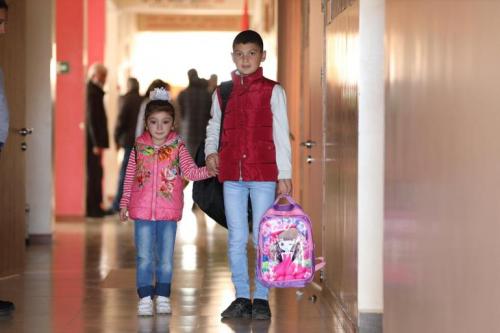Two-thirds of refugee children in Armenia enrolled in school, efforts must now focus on expanding access to education for all children
More than 21,000 school-aged children arrived in Armenia following an escalation of hostilities in their communities one month ago, 1 in 3 remain without access to education
Two-thirds of refugee children in Armenia are enrolled in national school systems, one month after more than 21,000 school-age children fled their homes. Efforts must now focus on increasing access for the remaining 1 in 3 children currently not attending school, UNICEF said on October 24.

Children who arrived in Armenia have not had continuous access to quality education in recent years, making an inclusive school system that provides catch-up classes and tailored support critical.
“Schools are more than places of learning. This is especially true in times of displacement and uncertainty. Access to education provides refugee children with the structure and support needed to help them overcome their experiences. Schools also provide children with nutrition and mental health services, socialisation and much more to support their health and well-being,” said Christine Weigand, UNICEF Armenia Representative.
“Investment must be made in increasing access to schooling for the 1 in 3 refugee children not enrolled in education and ensuring schools are inclusive for all children.”
UNICEF is on the ground working with the Government of Armenia and other partners to help refugee children access the care and support they need. Together with the Ministry of Education, Science, Culture and Sport, UNICEF is identifying needs and gaps in the current education system. This includes identifying areas that need bolstering and expansion to support effective inclusion of all refugee children.
UNICEF is providing educational kits including schools-in-a-box and early childhood development kits. In addition, UNICEF and its partners are distributing a first batch of schoolbags with stationary for 1,000 children. Procurement of an additional schoolbags to address the additional emerging needs of a further 2,000 children is ongoing. UNICEF is also gearing up to expand learning spaces in host schools and preschools across the country.
So far UNICEF has provided mental health and psychosocial support, and health and nutrition support for up to 10,000 refugee children and their caregivers. UNICEF and partners have also provided more than 1,000 children and caregivers with child protection case management support, and over 3,000 with psychological first aid.
UNICEF is appealing for US$ 12.6 million to provide critical services including education, health, child protection, nutrition and water, sanitation and hygiene in the first six months.
Source: United Nations International Children's Education Fund
- 328 reads
Human Rights
Fostering a More Humane World: The 28th Eurasian Economic Summi

Conscience, Hope, and Action: Keys to Global Peace and Sustainability

Ringing FOWPAL’s Peace Bell for the World:Nobel Peace Prize Laureates’ Visions and Actions

Protecting the World’s Cultural Diversity for a Sustainable Future

Puppet Show I International Friendship Day 2020

